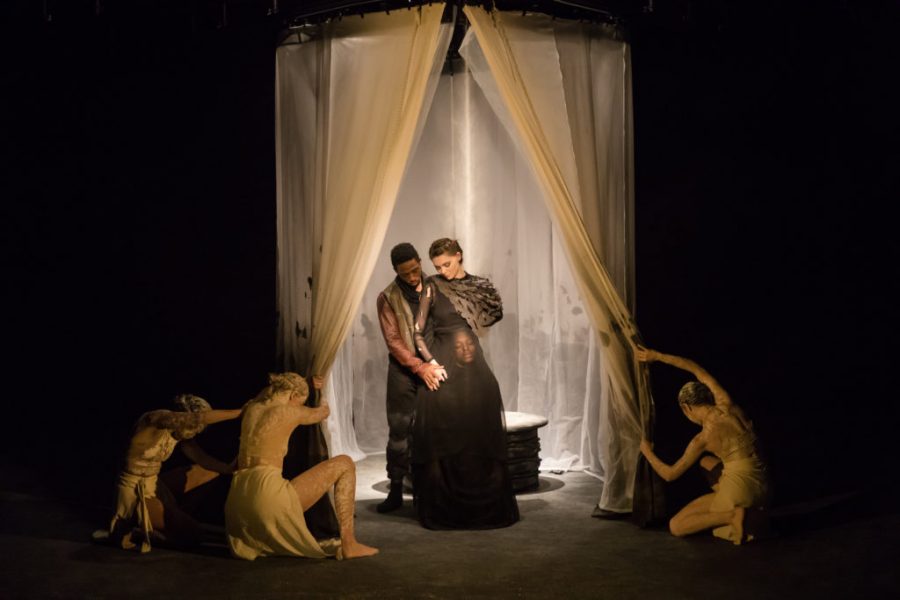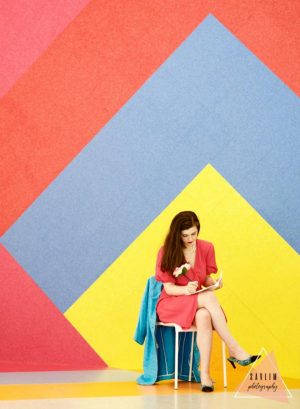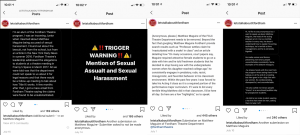Theatrical Musings: Adjusting to the Hybrid
Theater students rethink the ways that they create art during a socially distant semester
JOEY MORO VIA FORDHAM THEATRE
Many Fordham Theatre performances and classes will not occur in person this semester, but students in the program are looking to make the most of it.
August 21, 2020
While the past six months have been instrumental in adapting the entire world to the nuances of social distanced “online” learning and work from home, many wonder about the fate of the entertainment industry and live theater. While the white collar professionals and majority of the students of the world can still thrive in a contactless existence, the performing arts stream relies on physical interaction for its enabling. Would the Fordham theatre department successfully translate a largely physical curriculum in a socially distanced era?
While many theatre students are jostling with the idea of studying online, the university is implementing a largely cohesive curriculum for the theatre stream. “The theater program is planning to use the first week of classes to hold what is called a ‘teach in.’ Over the course of three separate meetings, the program will lay out the foundation of the year ahead of us. In order, these meetings will focus on an introduction to our season, the design and technology, and how our creative work is influenced by the world we live in. This will greatly help resolve any questions that students might have about how each show will be presented,” said theatre performance student Zoe Lishinsky, Fordham College at Lincoln Center (FCLC) ’22.
Although the Fordham theatre department has been relatively tight-lipped about the specifics of the online transition, two theatre students look forward to the new “creative” fall semester and all the new opportunities and challenges it offers.
Sofia Ubilla, FCLC ’21, is a rising senior double majoring in directing and Spanish studies. Her perspective on the nature of studies after the pandemic is refreshingly positive. Although like countless students, assimilating to the online approach was difficult in the spring semester, she feels optimistic about her classes for fall.
The physical component of theater will be virtual. This redefines the universal concept of theater. “I think the big question that is really exciting to me is what does it even mean to make theater. We can rethink the structures that are required to produce art and think about what it means to us and what we’re interested in,” Ubilla said.
A major component of the theatrical build will be lost in the translation to an online semester. However, Ubilla seems unfazed by this loss. “It is a really freeing experience to produce this Fall without worrying about the thesis. It is still theater but outside those constraints (mounting a big production) and I can dive into what I’m really passionate about. We can just collaborate with a few artists without worrying about rehearsal and set design.”
On the other hand, Lishinsky, who is majoring in acting, believes that in-person collaboration supersedes the online component. However, she has decided to take it as an opportunity to learn and develop different skills in the digital theatrical world.
“Theater makers are born to change and transform, so even though this switch to online learning was unprecedented, I am proud of every single artist who is using their skills learned overtime to create digital theater.” Lishinsky said.
Lishinsky also highlights the challenges that every artist and collaborator may have to face in a digital translation of theater. “From a personal standpoint, actors must become more nuanced, and must learn to practice their craft without their scene partners present in the room with them.
“Lighting, set and sound designers must learn and adapt to this format by discussing different ways to present their craft with tech consultants. Stage managers, directors, dramaturges, and so many more will need to use their skills to adapt, collaborate, and think outside the box,” she continued.
With the fall semester approaching in its new avatar, both Lishinsky and Ubilla offer their snippets of wisdom on adjusting to the new “real.”
“Be open. Allow yourself to be swept up in the process of learning. Theater is best learned when our obstacles are presented as opportunities,” Lishinsky said. Ubilla urges everyone to find the little positive things in life that can be controlled. It is important to find the silver lining in every situation.
Maybe the silver lining can transform into the silver sky.
















